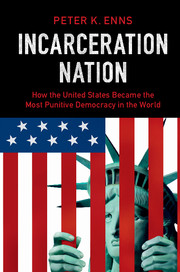6 - Punitive politics in the states
Published online by Cambridge University Press: 05 March 2016
Summary
The Commissioner of the Massachusetts Department of Correction “is concerned with the ‘hardening public attitudes’ which, he feels, threaten any humane approach to correction.”
(The Boston Globe, December 8, 1976)The United States has the highest incarceration rate in the world —; unless we consider the individual states. In 2013, sixteen states ranked above the overall US incarceration rate. Louisiana topped the list with an incarceration rate more than one-and-a-half times the US rate. One out of every thirty-one Louisianans was incarcerated, on probation, or on parole. These numbers show that to fully understand the rise of mass incarceration in the United States, we must also look to the states. Not only do the states house the lion's share of the prison population — around 90 percent of all inmates — but state governments have played a crucial role in the growth of the carceral state. And as this chapter's opening quote from Frank A. Hall (the former commissioner of the Massachusetts Department of Correction) implies, public opinion in the states was a major contributing factor.
Perhaps the most important way political actors influenced the incarceration rate (at both the state and federal levels) has been through changes in sentencing laws, such as the adoption of determinate sentencing and mandatory minimum sentences. New York's “Rockefeller Drug Laws,” which Governor Nelson Rockefeller signed into law on May 8, 1973, illustrate the two ways that sentencing laws can influence the incarceration rate. First, these laws increased the number of people going to prison by legislating mandatory prison sentences for crimes that previously did not result in prison time. For example, prior to the Rockefeller Drug Laws, possession of a small amount of LSD or methamphetamines was a misdemeanor crime. The maximum punishment was one year in a local jail, but probation, conditional discharge (no imprisonment or probation, conditional on meeting court-ordered requirements, such as drug treatment), or unconditional discharge (no imprisonment or probation) was more likely. However, after the Rockefeller Drug Laws, the possession of a tab of LSD carried a mandatory sentence of one year to life and possession of two ounces of methamphetamines carried a mandatory sentence of one to fifteen years.
In addition to increasing the number of people going to jail, changes in sentencing laws increased the incarceration rate by extending the length of sentences.
- Type
- Chapter
- Information
- Incarceration NationHow the United States Became the Most Punitive Democracy in the World, pp. 127 - 155Publisher: Cambridge University PressPrint publication year: 2016



